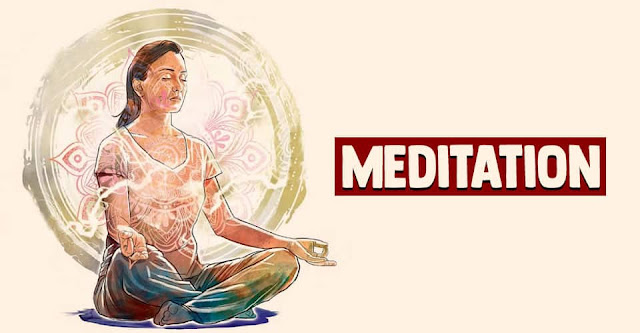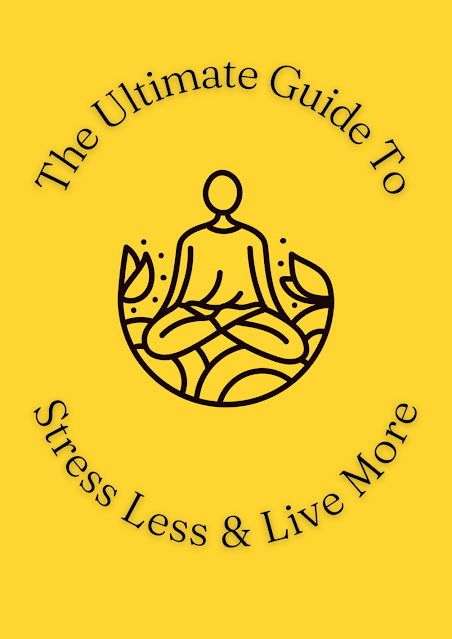Stress Less Live More: The Benefits of Stress-Free Living
Namaste,
Welcome to our blog on meditation and stress reduction. In today's fast-paced world, stress has become a common part of our daily lives. It not only affects our mental and emotional health but also has an impact on our physical wellbeing. However, with the practice of meditation, we can significantly reduce our stress levels and find a balance between our work and personal life. In this blog, we will explore the benefits of meditation, how it can help in reducing stress, and ways to incorporate meditation into our daily routine. Let's get started!
“Discover the power of meditation and reduce stress in your daily life. In this blog, we explore the benefits of meditation and provide tips on how to incorporate it into your daily routine. Join us on a journey to find balance and fulfillment through the practice of meditation.”
 |
| Meditation |
What is Meditation?
Meditation is a practice that involves training the mind to focus and achieve a state of calmness and relaxation. It is a mental exercise that can be performed in various ways, including sitting, standing, and walking. Meditation has been practiced for centuries and is commonly associated with spirituality and religious practices. However, it is also used as a secular practice to promote physical and mental well-being. Meditation involves focusing the mind on a specific object, thought, or activity, and practicing mindfulness to increase awareness of one's thoughts, emotions, and physical sensations. The goal of meditation is to achieve a state of deep relaxation, reduce stress and anxiety, improve mental clarity and concentration, and promote a sense of inner peace and well-being.
Types of Meditation
Here are some easy and beginner-level meditations, like :
Mindfulness meditation: This involves paying attention to the present moment, focusing on your breath, and noticing any thoughts or sensations that arise without judgment. - Loving-kindness meditation: This involves cultivating feelings of love, compassion, and kindness towards yourself and others.
- Transcendental meditation: This involves the use of a mantra, a repeated word or phrase, to help focus the mind.
- Progressive relaxation meditation: This is a form of mindfulness meditation that involves focusing on each muscle group in the body, one at a time, and tensing and relaxing them.
- Visualization meditation: This involves creating a mental image of a peaceful or relaxing place and immersing yourself in that image.
Each type of meditation has its own benefits and may be more suitable for different individuals based on their preferences and needs.
What is Stress
Stress is a physiological response that occurs when our body perceives a demand or threat. It is a natural and necessary mechanism that prepares us to respond to a situation, such as a potential danger or a challenging task. When we experience stress, the body releases hormones like cortisol and adrenaline, which increase heart rate, blood pressure, and glucose levels. These physiological changes help us to cope with the situation at hand. However, when stress becomes chronic, it can have negative effects on our physical, mental, and emotional health. Chronic stress can lead to a range of problems, including anxiety, depression, insomnia, digestive issues, and cardiovascular disease. Therefore, it is important to understand the nature of stress and how it affects our bodies, so that we can take steps to manage it effectively.
Causes of Stress
Stress can be caused by various factors, including:
- Work-related stress: Such as heavy workload, unrealistic deadlines, or job insecurity.
- Financial stress: Such as debt, unemployment, or financial instability.
- Relationship stress: Such as conflicts with family, friends, or romantic partners.
- Health-related stress: Such as chronic illness, injury, or disability.
- Life transitions: Such as moving, getting married, having a baby, or experiencing a loss.
Identifying the sources of stress can help us manage it more effectively.
 |
| Stress Less Live More |
Benefits of Reducing Stress
Reducing stress can have numerous benefits, including:
- Improved mental and emotional health: Reduced anxiety, depression, and irritability.
- Better physical health: Reduced risk of heart disease, stroke, and other chronic illnesses.
- Improved cognitive function: Better focus, memory, and decision-making abilities.
- Increased productivity and creativity: Reduced stress can help us be more productive and creative in our work and personal lives.
Understanding the benefits of reducing stress can motivate us to prioritize stress reduction in our daily lives.
How Meditation Reduces Stress
Meditation is a powerful tool for reducing stress, and it works by engaging the mind-body connection. One way meditation reduces stress is by triggering the "relaxation response," a state of deep rest that is the opposite of the stress response. This response reduces heart rate, blood pressure, and muscle tension, and promotes feelings of calm and relaxation. Additionally, meditation helps us to focus on the present moment, which can reduce feelings of worry and anxiety about the future. By practicing mindfulness and acceptance, we can learn to observe our thoughts and emotions without judgment or attachment, which can lead to a sense of inner peace and a greater ability to cope with stress. Scientific studies have shown that regular meditation practice can lead to changes in brain activity and physiology that are associated with reduced stress and improved emotional well-being.
Scientific Evidence
Research has shown that meditation can have a significant impact on reducing stress levels.
- One study found that a mindfulness-based stress reduction program was effective in reducing chronic pain, anxiety, and depression in participants ↂ.
- Another study found that a mindfulness-based stress reduction program was effective in reducing social anxiety disorder symptoms in participants ↂ.
- A study conducted with veterans suffering from post-traumatic stress disorder found that those who practiced Transcendental Meditation had significant reductions in symptoms compared to a control group ↂ.
- A systematic review and meta-analysis of mindfulness meditation programs found that they were effective in reducing symptoms of anxiety, depression, and pain ↂ.
Tips for Reducing Stress Through Meditation
- Create a Calm Environment:
Find a quiet, comfortable space to meditate
Use aromatherapy or soft lighting to enhance relaxation
Consider using earplugs or noise-cancelling headphones to block out external sounds
- Simple Techniques:
Start with deep breathing exercises to calm the mind
Try The Body Scan Meditation to release physical tension
Practice Loving-Kindness Meditation to cultivate feelings of compassion and reduce negative emotions
- Incorporating Meditation into Daily Life:
Set a specific time each day for meditation
Use guided meditation apps or videos to stay motivated
Find an accountability partner to help you stay on track with your practice
By implementing these tips, you can reduce stress in your daily life and create a more balanced and fulfilling lifestyle through the practice of meditation.
Other Tips for Creating a Balanced and Fulfilling Life
In addition to meditation, there are other steps you can take to create a more balanced and fulfilling life. Here are some tips:
- Exercise and Physical Activity: Regular exercise can help to reduce stress and improve overall health. Find an activity that you enjoy, such as yoga, running, or swimming, and try to incorporate it into your routine.
- Healthy Eating Habits: What we eat can have a big impact on our mental and physical health. Aim to eat a balanced diet that includes plenty of fruits, vegetables, and whole grains. Avoid processed foods, sugary drinks, and excessive amounts of caffeine.
- Time Management: Poor time management can lead to stress and anxiety. Use a planner or schedule to keep track of your commitments and prioritize your tasks. Learn to say no to unnecessary requests and delegate tasks when possible.
By incorporating these tips into your daily life, you can create a more balanced and fulfilling lifestyle. Remember, small changes can make a big difference!
 |
| Stress Less |
Conclusion
In conclusion, incorporating meditation into your daily routine can significantly reduce your stress levels and promote a more balanced and fulfilling life. By creating a calm environment, practicing simple techniques, and making meditation a regular part of your routine, you can experience the many benefits it has to offer. Additionally, other healthy habits such as exercise, healthy eating, and effective time management can further enhance your overall well-being. So, take a step towards a more balanced and fulfilling life by giving meditation a try. We hope this blog has provided you with valuable insights and encouragement to start your journey towards a stress-free and fulfilling life.

.jpg)



No comments:
Post a Comment